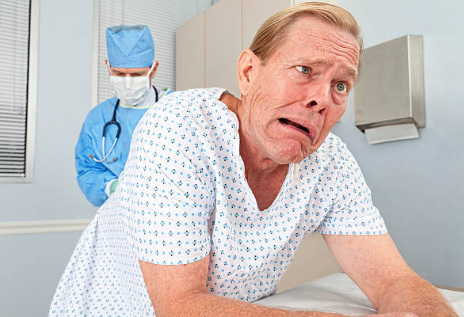Enlarged Prostate? Understand Benign Prostatic Hyperplasia (BPH) Treatments
 Prostate Problems After 40: Understanding and Tackling Benign Prostatic Hyperplasia (BPH)
Prostate Problems After 40: Understanding and Tackling Benign Prostatic Hyperplasia (BPH)
Your prostate, a walnut-sized gland that’s part of your reproductive system, might not have been on your radar much before. But as you hit your 40s and beyond, changes are happening. For many men, one of those changes is benign prostatic hyperplasia (BPH).
What the Heck is Benign Prostatic Hyperplasia (BPH)?
Let’s break down that medical jargon. “Benign” means it’s not cancer, “prostatic” means it has to do with the prostate, and “hyperplasia” means an increased number of cells causing the prostate gland to enlarge. Basically, your prostate is growing bigger, potentially causing some unwelcome issues as it gets older.
Wait, Am I the Only Guy Dealing with This?
Definitely not! BPH is super common in older men. After age 50, at least half of all men have it, and it affects a whopping 90% of men by their 80s. So, you’re in good (and numerous) company!
Ugh, So What Are These Annoying Benign Prostatic Hypertrophy Symptoms?
Here’s where it gets real, guys. BPH can make your bathroom trips a whole lot more complicated:
- Frequent Gotta-Go Feeling: Suddenly feeling like you’ve got to pee all the time, day and night.
- Weak Urine Flow: Like you’re waiting forever for things to get started, or the stream is disappointingly weak.
- Dribbling Trouble: Trouble stopping completely, leading to those embarrassing dribbles.
- Urgency Issues: Feeling an overwhelming need to pee right NOW, sometimes leading to accidents.
- Trouble Emptying Your Bladder: Feeling like your bladder never fully empties.
Okay, That’s Not Fun. But is BPH Dangerous?
Generally, BPH itself isn’t life-threatening. But, if left untreated, those annoying benign prostatic hypertrophy symptoms can worsen, impacting your quality of life. In severe cases, BPH can lead to complete blockage, kidney issues, or bladder infections. That’s why it’s key to address it.
Alright, How Do I Know for Sure it’s BPH?
Don’t self-diagnose, buddy! If you’ve got those bothersome symptoms, hit up your doctor or a urologist (a specialist in urinary issues). They might use some of these tools:
- Talk Time: Discussing your symptoms and medical history
- Digital Rectal Exam (DRE): Yep, the finger-up-the-bum check to feel your prostate’s size.
- Prostate-Specific Antigen (PSA) Test: A blood test that can help rule out prostate cancer.
- Other Tests: Uroflowmetry tests (measuring your urine flow rate) and ultrasounds might be used.
Got it! So, How Can I Fix This BPH Thing?
You’ve got options. The best approach depends on the severity of your benign prostatic hypertrophy symptoms and your overall health. Here’s the general scoop:
1. Wait and See (aka Watchful Waiting)
For mild symptoms, this initial step is often recommended. You’ll make lifestyle changes while your doctor monitors the situation.
What Lifestyle Changes Can I Make to Help?
- Double-Void: Try peeing, wait a bit, then pee again to empty your bladder more fully.
- Timed Trips: Even if you don’t feel you have to go, take scheduled bathroom breaks.
- Fluid Management: Limit evening fluids, and go easy on caffeine and alcohol.
- Med Awareness: Avoid over-the-counter decongestants and antihistamines, which can worsen symptoms.
2. When It’s Time for Medication Loads of effective benign prostatic hyperplasia drugs exist. Here are a few common types:
- Alpha-Blockers: Relax prostate and bladder muscles, improving urine flow (examples: tamsulosin, alfuzosin).
- 5-Alpha Reductase Inhibitors: Shrink the prostate over time (examples: finasteride, dutasteride)
- Phosphodiesterase-5 Inhibitors: Mainly for erectile dysfunction, but can also improve urinary symptoms (example: tadalafil).
- Plant-Based Supplements: Saw palmetto is a popular choice, though its effectiveness is debated.
Important Note: Talk to your doc about side effects and which meds are right for you!
5 FAQs tailored to the article above, designed to address common questions men might have about BPH:
FAQ 1: I think I have BPH. Should I see a doctor right away?
Answer: If you’re experiencing bothersome urinary symptoms, absolutely consult with a doctor. While BPH isn’t usually dangerous, it’s important to get a proper diagnosis to rule out any other underlying conditions and determine the best course of treatment for your specific case.
FAQ 2: I’m not keen on pills. Are there natural remedies for BPH?
Answer: While saw palmetto is a popular supplement for prostate health, its effectiveness for BPH remains somewhat unclear. Always discuss supplements with your doctor, especially regarding potential interactions with other medications. Lifestyle changes like limiting caffeine and managing fluids can also play a helpful role.
FAQ 3: How fast do BPH medications work?
Answer: Some medications, like alpha-blockers, can provide relief from symptoms relatively quickly – sometimes within days or weeks. Others, like 5-alpha reductase inhibitors, generally take longer to shrink the prostate significantly. Your doctor can give you more specific expectations based on your individual situation.
FAQ 4: Are there any BPH treatments that don’t involve ongoing medication?
Answer: Yes! For those bothered by side effects of medication or looking for a longer-term solution, several minimally invasive procedures exist. These range from heat-based therapies to implants that relieve pressure on the urethra. Your doctor can discuss whether these options might be suitable for you.
FAQ 5: Will BPH affect my sex life?
Answer: Some, but not all, BPH medications can potentially impact sexual function. Medications like tadalafil can treat both BPH symptoms and erectile dysfunction. It’s crucial to have an open conversation with your doctor about these concerns and find the treatment plan that balances prostate health and sexual well-being.
Disclaimer:
The information provided in this article is intended for general knowledge and informational purposes only, and does not constitute medical advice. It is essential to consult a qualified healthcare professional for diagnosis and treatment of any health condition. Never disregard professional medical advice or delay in seeking it because of something you have read in this article.
